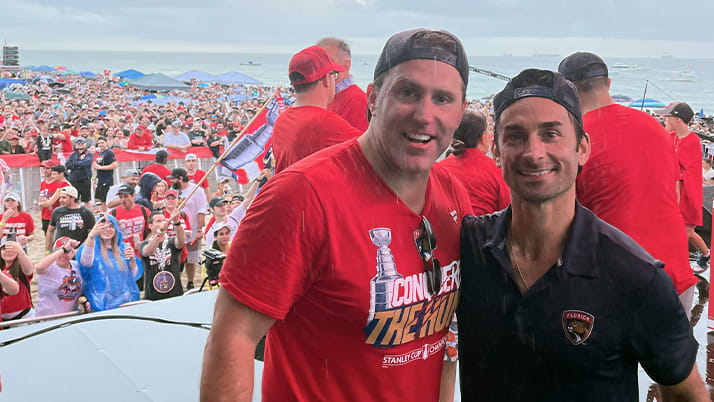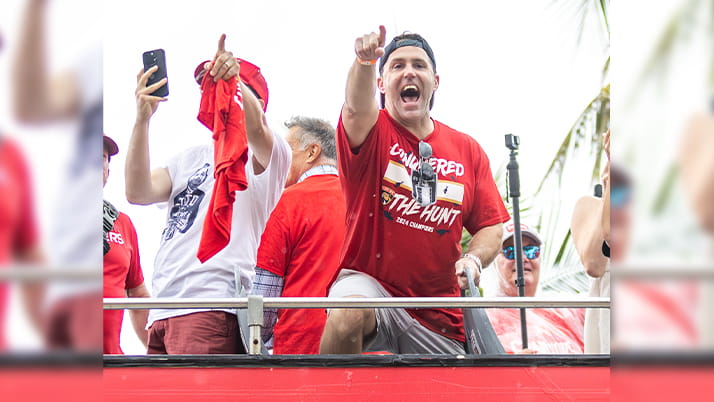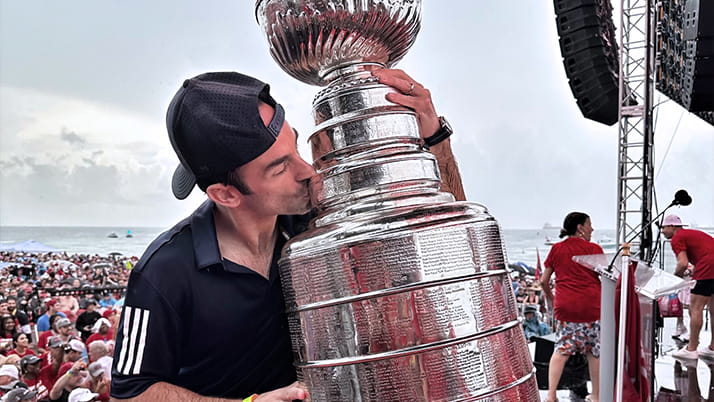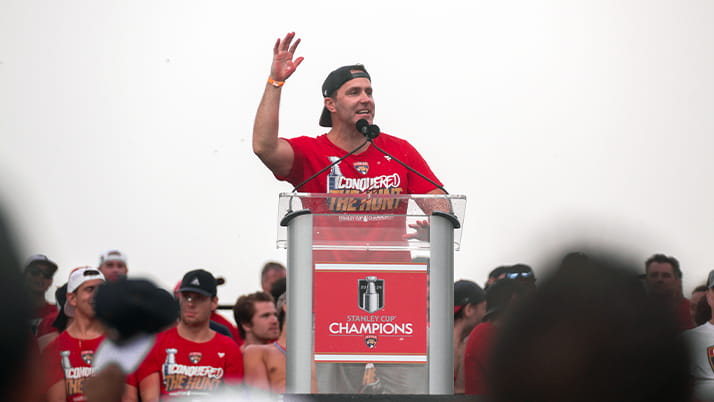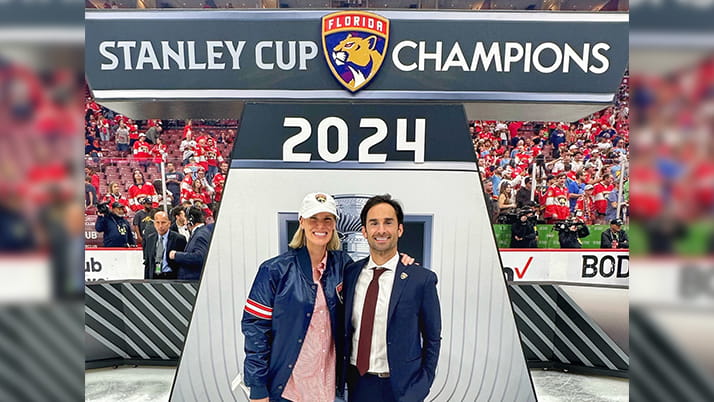Giving claws to Panthers
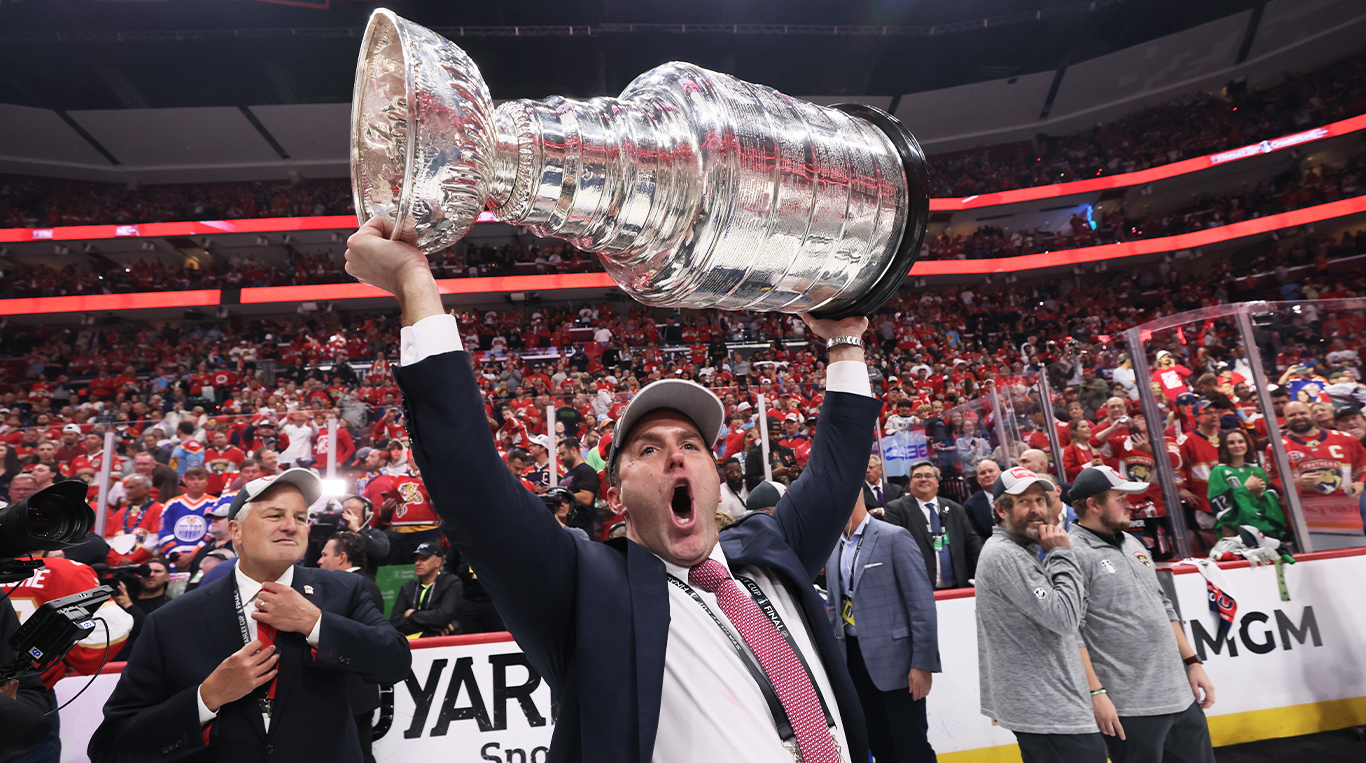
By Michael Blanding
When Matt Caldwell ’10 JD, MBA first arrived in Fort Lauderdale in 2013 to work with the Florida Panthers, the NHL franchise was in even worse shape than he’d expected. Caldwell was working as an adviser to Vincent “Vinnie” Viola, a billionaire investor who had just bought the team in hopes of turning it around. Founded in 1993 by businessman Wayne Huizenga, the team had struggled since Huizenga sold it in 2001, reaching the postseason only once in the next 12 years. The Panthers had become a running joke in the NHL — a place where aging hockey players went to retire by the pool. The team had sold only 3,000 season tickets for a nearly 19,250-seat stadium, and it was literally giving tickets away to fill seats. It would take nearly a decade to bring the Stanley Cup within reach.
“We knew it was going to be a lot of hard work,” Caldwell says. “That said, when we looked under the hood, we kept finding more problems.” Bottom line, the team needed a miracle. “The product on the ice was not good,” Caldwell says. “When you don’t win, it doesn’t matter what market you are in — it’s very difficult to build the brand.” Becoming CEO of the team the following year, Caldwell had no choice but to roll up his sleeves and get to work. Despite the team’s sorry reputation, Viola was committed to turning the Panthers into champions. It was up to Caldwell to fulfill that vision, some way, somehow, no matter what it took.
A ‘destination’ franchise
Growing up on Staten Island — itself a running joke to other New York City boroughs — Matt Caldwell was used to being discounted. Nevertheless, he grew up a Rangers fan with a heavy sense of duty and community service instilled by his father, an NYPD cop. For college, he went through officer training at West Point, graduating in 2002 and serving as a captain in the U.S. Army during combat operations in Iraq and peacekeeping operations in Kosovo. Leaving the military after five years, he enrolled in the JD-MBA program at the Northwestern School of Law and the Kellogg School of Management in search of new opportunities. At Kellogg, he was influenced by entrepreneurship professor Steven Rogers, who impressed upon students the importance of recurring revenue — ironically, using Wayne Huizenga’s pursuit of season tickets for his sports teams as an example.
Caldwell met Viola while working at Goldman Sachs after Kellogg. Impressed with his ambition and energy, Viola tapped Caldwell to run point on turning around the Panthers. In another coincidence, one of Caldwell’s classmates, Scott Kannry ’11 JD, MBA, cowrote a case with clinical professor of strategy James Shein on the Chicago Blackhawks hockey team, one of the greatest turnaround stories in sports. “Literally during my first flight down to Florida, I mentioned it to Scott, and he sent me the case,” Caldwell says. With “recurring revenue” echoing like a mantra through his head, Caldwell focused on winning back fans through season tickets.
One of his first actions was ending the Panthers’ popular free ticket giveaways, which were upsetting season ticket holders who were paying for their seats. “We had to rip off the Band-Aid,” he says. “We were going to work really hard — spend money on players, draft well — and we were going to expect people to pay for their tickets.” The low point came early in the 2014-15 season, when barely 7,000 fans filled the stands. Having learned in the military the power of leading by example, Caldwell set up his desk on the selling floor, helping his employees make cold calls. “I thought it was important to get into the trenches.”
If the team was going to expect people to buy season tickets, they had to have something worth buying, so Caldwell turned to the things he could control. While teams usually contract out services, Caldwell took the unusual step of bringing everything in the arena inside the organization — ushers, ticket takers, concessions and parking lot attendants. “From the moment someone drives to the arena, we wanted to own every touch point,” he says. “If someone has a bad experience, they are going to blame the team anyway.” Caldwell used the lessons from his entrepreneurship classes to set up these mini-businesses, hiring and training legions of workers. At the same time, Viola expressed his commitment to the local community, donating $1 million a year to causes and opening the arena as a safe haven during hurricanes.
Of course, no amount of retooling operations could save the team if it wasn’t performing on the ice. Given its poor record, the Panthers had a number of top draft picks several years in a row. The team used those picks to create a nucleus of young players to build around, including 18-year-old Aleksander “Sasha” Barkov, then the youngest player in the league; defenseman Aaron Ekblad; and center Jonathan Huberdeau. A few years later, the team added goalie Sergei Bobrovsky. Still the team struggled, with a roster of too many players who weren’t reaching their potential.
Caldwell and ownership made the decision to bring in new hockey leadership, hiring Bill Zito, associate GM and alternate governor at the Columbus Blue Jackets, who shared their lofty ambitions. “What we loved most about him is he had this vision for what we wanted to create, which was a destination franchise,” Caldwell explains. No longer would the Panthers be seen as a place for players to go before retiring. By highlighting the quality of life in South Florida and a winning spirit, it would become a team that players could be excited to join.
In the 2020-21 season, the first with Zito as GM, the team saw some progress, making the playoffs but losing in a hard-fought battle with rival Tampa Bay Lightning. The next year, they scored their first playoff win in 26 years before once again falling to Tampa Bay. “We could have easily said, ‘Hey, we’re making progress; let’s keep things status quo,’” Caldwell says. Instead, Zito suggested a risky move. Seeing a need to bolster the defensive quality of the team, they traded front linesman Jonathan Huberdeau for younger player Matthew Tkachuk, a high scorer who had a more physical style of play. The team got off to a rough start for the first half of the season, but by the second half of the 2022-23 season, they were starting to see progress.
Feisty underdogs and local heroes
That progress was helped along by another Kellogg grad. Caldwell hired Mark Zarthar ’14 MBA, then the SVP of marketing for the Philadelphia Flyers, as chief strategy officer in early 2023, charging him with creating a stronger brand identity for the Panthers. Responsible for a wide range of priorities, Zarthar oversees not only business strategy and insights, but also brand strategy, broadcast, communications, ticket operations and special projects for the team.
Zarthar grew up in Massachusetts during the golden age of Boston sports in the early 2000s, when the Patriots, Red Sox and Celtics all racked up championships, the Bruins joining them at last in 2011. Following family members into the commercial real estate business, he came to Kellogg at age 24 expecting to further himself in that career, but when he saw sports companies recruiting on campus, he began to think about other possibilities. Finally, he asked a mentor in the real estate business for advice. “He said, ‘If you pick up a newspaper, what’s the first section you turn to?’” Zarthar remembers. “I always flipped to the sports section, read it front to back.” He made up his mind to pursue a career in sports marketing.
At Kellogg, Zarthar was inspired by a marketing class taught by Timothy Calkins, which introduced him to the power of brand strategy and the influence it has on revenue generation. Zarthar had the chance to try out concepts from the course a few years later in the marketing department of Anheuser-Busch, where after a few years with Bud Light, he became the brand manager for Natural Light, which was languishing with an image as a cheap, watery beer and a dwindling blue-collar customer base. At the time, Zarthar was reading the work of Adam Morgan, author of “Eating the Big Fish,” and found himself particularly interested in Morgan’s ideas about “challenger brands” and brand archetypes. Adopting the brand archetype of the Irreverent Maverick, Zarthar began pitching Natural Light to college students, leaning heavily into sports marketing by signing golfer Smylie Kaufman and scoring a feature in ESPN.com, followed by a partnership with Barstool Sports and an ironic tailgate presence at the Masters in Augusta, Georgia. “We had this large wave of college-age influencers posting photos of our products because all of a sudden it was cool,” Zarthar says.
Leaving Anheuser-Busch for his next big challenge, he moved from New York to Fayetteville, North Carolina, to spearhead the development of a new downtown stadium for the Woodpeckers, a minor league team of baseball’s Houston Astros. The town was best known as home of Fort Bragg, home to the Army’s 82nd Airborne Division and one of the largest military communities in the country. Rather than impose a brand on the community, Zarthar leaned into the existing military culture, branding the team with fierce black and red colors and positioning their games as a destination for soldiers and their families on nights and weekends. “We didn’t play classic baseball tunes; we played loud rock music,” he says. “We wanted to have an intimidating presence for the most badass city in America.” In 2019, Baseball Digest recognized the stadium as “ballpark of the decade.”
To create a brand strategy for the Panthers, Zarthar segmented fans into two groups — hard-core hockey fans and a “growth audience” of families, casual fans and transplants from other cities — each represented by its own challenger archetype. For the hard-core fans, he positioned the team as the Feisty Underdog, going up against the more established franchises. “Our key positioning was to stick it to Goliath — the Bruins, Maple Leafs, Penguins and other powers of the NHL who never gave us respect.” As Zarthar began spreading the strategy throughout the organization, players, coaches, and managers all naturally assumed the role. “Our forward, Matt Tkachuk, must have said it 100 times,” Zarthar says. “It reflected the way we played on the ice, and we really harnessed that underdog spirit and spoke it into existence when talking to the media.”
For the growth audience, he used a different archetype, the Local Hero, to unite the disparate fan bases into a unified whole. “If you look at South Florida, we have all these famous celebrities; we have palm trees and neon colors. It’s beautiful,” says Zarthar, who leaned heavily into that visual palette that fit the wider goal of the team as a destination franchise. “People celebrate that down there. They say, ‘I’m so proud that people look at our community as an aspirational place to be.’”
A thrilling series
With a growing sense of pride both on and off the ice, the Panthers broke out during the second half of the 2022-23 season, scraping into the playoffs as the bottom seed. They then stunned the league by beating the top-ranked Bruins in the first round. Not only that, but they went on to beat the Toronto Maple Leafs and Carolina Hurricanes to go to the Stanley Cup Final, ultimately losing out to the Vegas Golden Knights, four games to one. “It was an incredible feeling,” Caldwell says of the run; suddenly, tickets were flying off the shelves.
Even so, only two teams in the past 40 years had come back from losing the Stanley Cup to win the next season. “A lot of media were predicting a big drop-off,” Caldwell says. The Panthers didn’t waver from their goal, coming in hot during the 2023-24 season to finish near the top of the Eastern Conference. In the playoffs, the team beat archrival Tampa Bay Lightning in the first round before going on to best the Boston Bruins and New York Rangers — a particularly sweet victory for the Staten Island native. “All my New York friends were shocked. It broke their hearts,” he chuckles.
Once again, the Panthers made it to the Stanley Cup championship in June, this time against the Edmonton Oilers, an offensive powerhouse centered around Connor McDavid, one of the best players of all time — setting up the contest as an epic battle of Edmonton’s offense versus Florida’s defense. The Panthers didn’t hesitate, winning three games in a row to bring themselves within one game of the cup. Then they stumbled, losing three games back-to-back. “All the media were talking about the biggest collapse in history,” says Caldwell, who delivered a speech to the front-office staff worthy of a sports movie before the final game in Fort Lauderdale. “We’re not waving the white flag — we’re going to come out tonight and give it everything we’ve got,” he told them. “But no matter what happens, we have a lot to be proud of. We have a packed house and sold-out games every night — let’s go enjoy this.”
Their big moment came on June 24 with Game 7 and the match that would decide the Stanley Cup victors. The atmosphere in the arena was electric, with a star-studded audience of celebrities and Canadian pop star Alanis Morissette leading the crowd in singing both “O Canada” and “The Star-Spangled Banner” before play. Hometown fans burst into a frenzy when forward Carter Verhaeghe scored within five minutes, only to be silenced by an Edmonton goal two minutes later, tying the game. Finally, in the second period, Panthers forward Sam Reinhart scored another goal, and Florida’s defense kept off the attackers. The Panthers won the game 2-1, becoming Stanley Cup champions for the first time in franchise history.
“It feels funny saying it — I’m still in disbelief,” says Caldwell. He was shocked, as much over the win as the fact that, 10 years after he took over, the team now has 15,000 season-ticket holders and sold out 75% of its games this past season. More important, the Panthers are seen not as a joke but as a dominating force in the league.
Not that the team is resting on its laurels. “It’s critical to celebrate when things go well,” says Zarthar. “At the same time, we haven’t moved on from being that Feisty Underdog.” He’s positioned the team as even more of a Local Hero by helping renegotiate the team’s television license away from a failing regional cable network toward local broadcast to increase the team’s reach in the community. “We went from having 30% of households in South Florida being able to watch games on TV to close to 100%,” he says.
For Caldwell, the journey has been a lesson in perseverance. “Ultimately, anything can be accomplished with the right vision and the right commitment,” he says. The franchise may have changed its strategy at times, but it never wavered from its ultimate goal of creating a team that could proudly hold its own in the playoffs and eventually take the top prize. “Sometimes people give up too early and change their vision, starting to look at their next best option. We always had faith that we would be able to build this,” Caldwell says. “We changed our defensive strategy, and we changed the GM, but it all came down to building a destination franchise — all roads led back to that ultimate goal.”
Inside the Celebrations
To celebrate the team’s historic win, Caldwell and Zarthar shared some behind-the-scenes photos from the Stanley Cup victory parade and rally. Here are some of their favorite moments:

